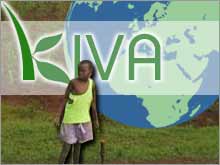|
Be a global financier...on a shoestring
Web site lets you loan as little as $25 to overseas entrepreneurs; eBay said to be in on it next.
NEW YORK (CNNMoney.com) – If you've got 25 bucks, a PC and a PayPal account, you've now got the wherewithal to be an international financier. Thanks to www.Kiva.org, a California-based Web site that connects lenders and borrowers from around the world, anyone can scan business proposals, photos and background information on potential borrowers and decide if the gambit's got legs.
The concept of letting individual, small-time, lenders pick and choose which projects to fund is new in microfinance -- the field of providing very small loans to start-up businesses, usually in the developing world. In the past the industry has been dominated by a handful of large non-profits that operate on grant money or raise cash in capital markets and then distribute as they see fit. Although Kiva has been operating for just over two months and has served just 50 borrowers so far, all in eastern Africa, co-founder Matthew Flannery said there has been a large amount of interest in the site. "I sit in front of a tidal wave of money," said Flannery, saying that the number of lenders far exceeds the number of people they can find to borrow the cash. "Businesses are funded in the same day that they're posted." So much interest that eBay's PayPal is said to be working on a similar type of site. Although a spokeswoman for PayPal said the company wouldn't comment on what she said "would at this point be considered rumors," three people in the microfinance industry confirmed that eBay (Research) is developing such a site. Yet some in the microfinance field are concerned that simply sending more money to less developed countries will take attention away from the need to build stronger local financial institutions, fostering a relationship of dependency. Wanna buy a goat?
Kiva, unlike some Wall Street funds investing in microfinance, isn't designed as an investment vehicle. Lenders on Kiva can hope to get their loan repaid in full, but they don't get paid interest. The "return on investment" comes in the form of pictures and stories of a business idea moving from a concept to a (hopefully) money-making reality. Using PayPal as an intermediary, lenders create an account at Kiva and can then browse through photos and business pitches from those seeking a loan. Pitches from people like Charles Ekoju, who wanted $500 to buy eight bails of used clothing to sell out of his house. Or Joseph Adongu, who got $500 to add better goats to his herd. "That is now helping him support his family and pay school fees for his children," reads Adongu's monthly update on Kiva. "With large profit he gets, he is faithful in handling the loan and paying back promptly." The lender, whose loan can be combined with others to meet the needs of a borrower, is credited through their PayPal account as the loan is paid back. Flannery and his small staff at Kiva don't go out into the field in Africa and make the loans themselves. Instead they partner with local organizations which vet the applicants, make the loan and then visit the business and report on the progress. The reports appear about once a month on the Web site. The loans Kiva gives are not interest free, but Kiva doesn't keep the money. It helps pay the costs of the partner organization. Kiva is currently operating on a budget of a couple hundred thousand dollars a year from private donations, but Flannery said he hopes to fund the site through transactions fees associated with the money transfers in the future. Flannery said he's looking for more borrowers and will soon expand beyond Africa, but the process is slow as each partner organization needs to be carefully scrutinized. And Kiva itself is still in the process of getting its non-profit status, which will enable its financial statements to be independently verified. Until then, a lender needs to have faith that Kiva is actually using the money as it says. Fear of the cash tidal wave
Yet the level of lender interest, both from a site like Kiva targeting individual lenders and Wall Street firms investing in larger microfinance funds, is raising some concern. While generally supportive of the concept, some in microfinance are worried that direct cash investments may divert attention from the need to strengthen local financial institutions like banks, fostering dependence on outside money. "We need to be careful to not be naive by thinking that simply transferring money from the North to the South is going to solve problems," said Elizabeth Littlefield, director of the Consultative Group to Assist the Poor (CGAP), a microfinance think tank. "Savings exist in the places where we work, but it's under mattresses or buried under floorboards." And Beth Houle, an executive at microfinance institution Opportunity International, said a site like Kiva, which relies on posting stories and photos of borrowers to attract donor interest, might not be cost effective on a larger scale. Flannery said he also wondered how cost effective the site would be and stressed that he doesn't intend to operate in places where other forms of loans are available. And he said taking photos and posting stories didn't take that much time and was something many of the bigger microfinance organizations did anyway, they just don't put it on the Web. He also said people are responding to the photos and pictures, so they might be necessary not matter how expensive they are. "It will create a lot more capitol because that's what people want," he said. _____________________________ EBay's founder starts giving...to microfinance. Click here.
Thinking of starting your own business? Click here. |
|



